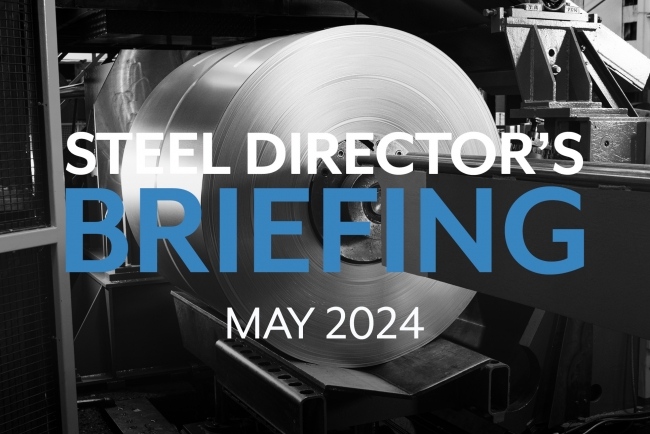Steel Director's Briefing - May 2024

In response to these global market shifts, major European mills like Thyssenkrupp have already begun to reduce capacity. ArcelorMittal is expected to follow suit, with commentators anticipating that they will use the upcoming summer shutdown as an opportunity to take out production capacity.
Despite attempts by Far Eastern mills to increase prices, these adjustments have struggled to gain traction. This has been further complicated by the volatility of the Pound-Dollar exchange rate, adding an undesirable layer of confusion and unpredictability to pricing strategies.
However, there are some signs of positivity. For example, MEPS forecasts a rise in European steel demand, anticipating growth of 2.9% in 2024 and an encouraging 5.3% in 2025. This positive outlook will be welcome news to steel producers in Europe.
Turning our focus to the UK, the economic climate is marked by a cautious business sentiment. The construction industry presents a mixed picture: while some customers have ramped up their steel requirements, others remain restrained. High interest rates have been a significant brake on construction activity, making companies hesitant to launch new projects or expand existing ones.
The automotive sector, too, hasn't fully rebounded to pre-pandemic levels, affecting the demand for automotive-grade steel. As I wrote last month, the lack of direction and a clear automotive industrial strategy from the UK government continues to be a huge missed opportunity that is harming confidence and hindering investment. Sadly, despite an election looming on the horizon, manufacturing looks unlikely to be featuring heavily in any of the main party’s manifestos.
Amidst ongoing uncertainty following Tata Steel's strategic decision to shift away from blast furnaces to Electric Arc Furnaces at Port Talbot, the potential for industrial action has become a focal point of concern. Recent developments have seen the Unite union voting in favour of strike action. The precise consequences of this decision are still unfolding.
As we continue to monitor these events, the potential for supply chain disruption needs to be taken seriously, adding another layer of complexity to the already uncertain landscape surrounding Tata's operational changes.
As these developments continue to unfold, our focus at Cooper and Jackson remains on understanding and adapting to these market changes. We have been actively engaged in helping our customers navigate these uncertainties, ensuring their supply chains remain robust amidst potential disruptions.
